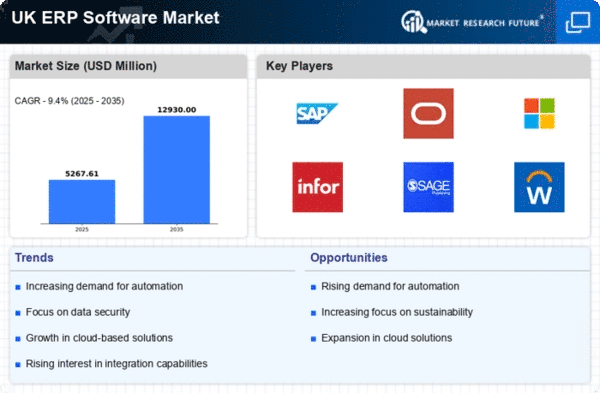The ERP software market is currently characterized by a dynamic competitive landscape, driven by rapid technological advancements and evolving customer needs. Key players such as SAP (DE), Oracle (US), and Microsoft (US) are at the forefront, each adopting distinct strategies to enhance their market positioning. SAP (DE) focuses on innovation through its cloud-based solutions, aiming to streamline business processes and improve operational efficiency. Oracle (US) emphasizes mergers and acquisitions to expand its product offerings and enhance its capabilities in cloud computing. Meanwhile, Microsoft (US) leverages its existing ecosystem, integrating ERP solutions with its Azure cloud platform to provide comprehensive services that cater to diverse business requirements. Collectively, these strategies contribute to a competitive environment that is increasingly centered around technological integration and customer-centric solutions.
In terms of business tactics, companies are increasingly localizing their operations and optimizing supply chains to respond to market demands more effectively. The competitive structure of the ERP software market appears moderately fragmented, with several key players exerting substantial influence. This fragmentation allows for a variety of solutions tailored to specific industry needs, fostering innovation and competition among providers.
In October 2025, SAP (DE) announced a strategic partnership with a leading AI firm to enhance its ERP offerings with advanced analytics capabilities. This move is likely to position SAP (DE) as a frontrunner in the integration of AI within ERP systems, potentially improving decision-making processes for its clients. The partnership underscores SAP's commitment to innovation and its focus on leveraging cutting-edge technology to meet customer demands.
In September 2025, Oracle (US) completed the acquisition of a prominent cloud-based ERP provider, which is expected to bolster its market share and expand its service portfolio. This acquisition not only enhances Oracle's capabilities but also reflects a broader trend of consolidation within the industry, as companies seek to offer more comprehensive solutions to their clients. The strategic importance of this move lies in Oracle's ability to integrate new technologies and services, thereby enhancing its competitive edge.
In August 2025, Microsoft (US) launched a new version of its ERP software that incorporates machine learning features aimed at automating routine tasks. This development is indicative of a growing trend towards automation within the ERP sector, as businesses increasingly seek to improve efficiency and reduce operational costs. By integrating machine learning, Microsoft (US) positions itself as a leader in innovation, catering to the evolving needs of its customer base.
As of November 2025, current trends in the ERP software market are heavily influenced by digitalization, sustainability, and AI integration. Strategic alliances are becoming increasingly vital, as companies recognize the need to collaborate to enhance their technological capabilities. Looking ahead, competitive differentiation is likely to evolve, shifting from price-based competition to a focus on innovation, technology, and supply chain reliability. This transition suggests that companies that prioritize these aspects will be better positioned to thrive in an increasingly competitive landscape.

















